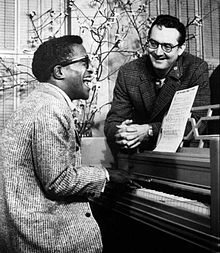I just read Alan Sepinwall's
The Revolution Was Televised, about how TV drama has changed, well, dramatically, in the past decade or so. It covers a lot of the same ground
Brett Martin's Difficult Men does--the starting point of the revolution is
The Sopranos, and it's since continued in shows like
The Wire,
Deadwood, The Shield,
Mad Men and
Breaking Bad. The two biggest differences are 1) Brett Martin is a general reporter who is turning his attention to the men who created these shows, while Sepinwall is a TV critic (first at the
Star-Ledger--Tony Soprano's paper--and
now on the internet) who approaches from below, having watched these shows when they were first on, often reviewing them episode by episode and 2) Sepinwall includes network shows in the revolution, such as
Lost,
Buffy The Vampire Slayer,
24 and
Friday Night Lights.
Sepinwall is probably the most readable TV critic around, so it's nice to have him on record about this era. Each chapter gives us the history of one particular show as well as his take on it. Reading
The Revolution Was Televised brought back a lot of memories, both good and bad (mostly good).
Take
Lost. For five of its six seasons it was my favorite show ever, and even if the sixth was disappointing it can't take away the memory. It had a strange genesis, where an ABC head on his way out came up with the idea and ordered it made quickly after the first pilot script he saw didn't cut it, and it went on to help the network turn itself around. Sepinwall goes into all this, but also explains the rise and fall and rise and fall of the show. It was the most expensive pilot ever, but no one was sure it would get beyond that, and when it was picked up the producers figured it'd go one season and that would be it, so didn't plan much after that--when it became huge they were in despair. They'd figured the characters out (including Locke, whose story told in the fourth hour, "Walkabout," was when the series clicked for a lot of fans, including me), but now had to go heavily into the Island's mythology (the Dharma Initiative, Jacob and the Man In Black and so on)--otherwise, they would have just ended the season as a great miniseries where the characters face down the Smoke Monster at the end. They had to figure how to keep everyone on the Island and introduce new characters and do quite a bit else. They also didn't show what was in the hatch till season two, which drove fans crazy.
By the third season they were in trouble again. As it was, the tailies introduced in season two hadn't gone over that well--though Desmond and Ben sure did--but now they had to keep things going indefinitely, and many felt the show was running in circles. Nikki and Paulo certainly didn't help. So, with everyone talking about the new show
Heroes giving satisfying answers to its mysteries, the producers convinced ABC to put a cap on the episodes. The producers wanted five seasons, the network wanted eight, they settled on six.
They also had another trick up their sleeve--some of the Losties would get back home, only to realize they had to go back. And, this allowed them to pull one of the greatest coups in TV history: Jack's flashback at the end of season three was actually a flashforward.
Lost became a different show now that they were sure where they were going. It got a little more sci-fi (they'd tried to avoid too much at first) and it seemed poised for a powerful ending. Sepinwall does a great job pointing out the good and bad of season six. Not just the alternative universe, which was an interesting switch with a suprise ending that most fans didn't like. But also the action on the Island. Some of the mysteries were ho-hum, some weren't solved, but worse, the story, which should have been like an express train at this point, had stops and starts. We were invested in the story and the characters, and now we're spending the first half of the season at the Temple, with new characters. We'd heard about the Temple for some time, but it was too late to introduce something like this--who cares about the distractions provided by Dogen and Lennon when it's Jack, Kate, Hurley, Sawyer, Locke, Ben, Juliet and a bunch of others that we cared about. Then there was the Richard backstory, which the fans had been waiting for, but stopped the present-day story dead. Biggest of all, there was the episode where we learned the origin of the Island's magic, as well as Jacob and the Man In Black. Turns out their mother was as tight-lipped as everyone else on the show when it came to revealing secrets, but worse, just as the action in the present was coming to a fever pitch, the show stopped dead to look thousands of years into the past. The producers, though they still defend the finale, now admit it was a mistake to stop the story just to let the audience in on secrets--the right way to do it would to have been to let the Losties discover the secrets along with the audience.
Then there's
Battlestar Galactica, a show that was better than it had any right to be, but still wasn't good enough. It was a remake of a silly show from a few decades back, but the basic premise was actually pretty good--humanity has been mostly destroyed by Cylons, machines built by humans, and those left were on a mission to find Earth as the Cylons chased them. Then after 9/11 the whole concept took on a new gravity. That's when producer Ronald Moore--who'd worked on the later
Star Trek shows--created a manifesto that declared this show wouldn't be about weird aliens or the same sf drivel we've gotten used to, but would be about realistic and flawed humans in desperate straits.

Another great change--the new Cylons looked like people, which not only saved on special effects and costumes, but also added a sense of paranoia. Moore, however, wasn't much on planning too far ahead. He played a lot of it by instinct. Let's put Helo on this planet and see what happens. Let's have Six inside Baltar's head. Let's have the last five Cylons be different from the first seven. Let's have visions of an opera house. Let's have them sing a Dylan song. Let's make Starbuck an angel. Sometimes it worked, but as things went along, it led to disappointments--including a highly controversial ending that was rejected by many fans. To be fair to Moore, he has a good argument about grand plans in TV. It's hard enough to plan one season, much less a multi-season arc. Your main job is creating a gripping story each week, so what good is knowing how the show ends in five years when you get canceled this year. Anyway, budgets and actor availability may stymie your plans--as it did with Moore, who wanted more time on civilian ships but didn't have the money for sets--and what do you do if the audience doesn't like a new character or plot direction, keep it up for years just to spite them?
My biggest difference with Sepinwall comes in the
BG chapter. He claims the creative high point of the series came in seasons 2 and 3 when the humans decide to settle in New Caprica, and we flash ahead a few years where the Cylons find them and occupy their planet. High point? This was arguably when the show jumped the shark--certainly when it went in the wrong direction. There were good moments after, but the show was never the same. In the early seasons, there was constant tension as humanity was on the brink and barely understood their enemy. Settling down on a planet meant the search for Earth was over--the whole mission of
BG--so the show was, in effect, grounded. It lost even more tension when the Cylons became more familiar. (There was also a trial for Baltar which was mostly pointless.) And the political parallels, which used to be intriguing but not so on the nose that they slowed down the action, were now so obviously rubbing Iraq in our face that the show became tiresome for that alone.
The final revelations regarding the Cylons had some good moments, but overall this was when Moore's chickens came home to roost, and we saw he didn't really have much of a plan. It's not that you need to know everything--the
Breaking Bad chapter shows creator Vince Gilligan only had the vaguest concept in mind and he and his writers regularly painted themselves in and out of corners. But then, that's part of the fun in this age of TV drama. Shows have arcs like never before. Some showrunners, like David Chase in his
Sopranos, are ornery, trying to avoid giving the audience what it wants while giving them what he thinks they need. Others, like David Simon in
The Wire, are doing something almost beyond television, presenting a modern version of a Victorian novel, taking in all society, and willing to concentrate for some time on characters we might not notice in other shows.
And all along, Alan Sepinwall is watching, telling us what he thinks.















